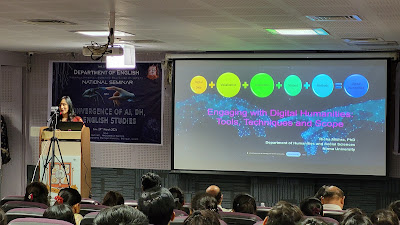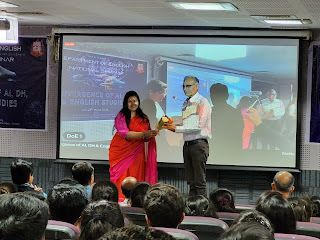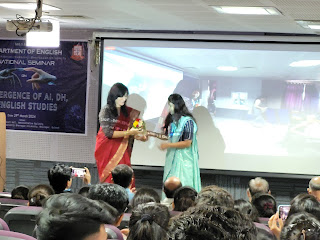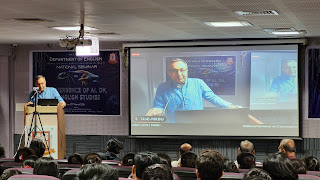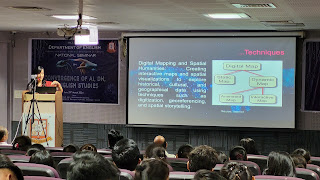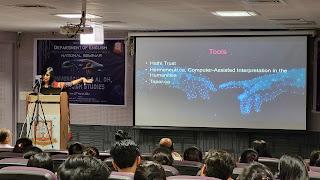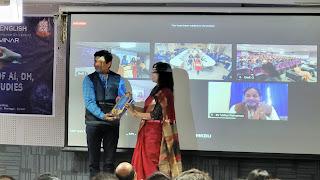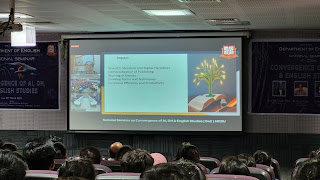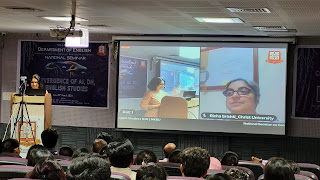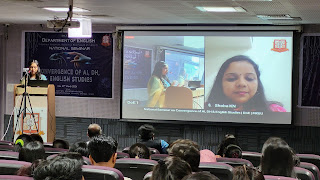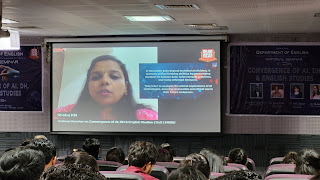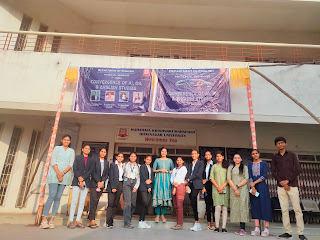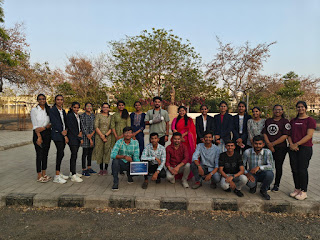National Seminar on Convergence of AI, DH, and English Studies
National Seminar on Convergence of AI, DH, and English Studies
(Note: To access photos click on the Table of Contents and then click on Photos.)
{getToc} $title={Table of Contents} $count={false}
Introduction:
On March 29, 2024, the students of Matushri R. R. Monapara Arts College attended the seminar titled 'National Seminar on Convergence of AI, DH, and English Studies', organized by the Department of English at Maharaja Krishnakumarsinhji Bhavnagar University.
This seminar examined how Artificial Intelligence (AI), Digital Humanities (DH), and English Studies intersect. It covered subjects like:
• How AI can help analyze literature
• Using Digital Humanities for studying texts
• AI's role in teaching and learning language
• Considering ethical issues in AI and DH research
Keynote speakers:
• Prof. and Dr. Nigam Dave from Pandit Deendayal Energy University, Gandhinagar
• Dr. Richa Srishti from CHRIST (Deemed to be University), Lavasa
• Dr. Richa Mishra from Nirma University, Ahmedabad
• Dr. Shoba K. N. from the National Institute of Technical Teachers Training and Research (NITTTR), Chennai
Opening:
In the opening talk, Prof. and Head of the Department of English Dr. Dilip Barad Sir stressed the importance of the seminar's theme. Sir explained that whenever something new is introduced, there is often initial resistance before it is accepted. He used Plato's idea to illustrate this, saying that truth is found in spoken words, not in lies claiming beliefs that aren't true. Plato called these lies "mimema," false reflections of beliefs. He also mentioned a story about the Greek god of invention.
During the seminar, most of the participants were girls. Sir noted this and linked it to International Girls in ICT Day, coming up on April 25, 2024. He emphasized the significance of empowering girls in digital literacy.
1. Prof. and Dr. Nigam Dave
Topic: Value Neutrality of Deepfakes and Its Positive Implications
Nigam Dave was the first speaker at the seminar. He talked about "Value Neutrality of Deepfakes and Its Positive Implications." Deepfake is fake media.
Sir started with a story about Helen of Troy and Rishi Chyavan. He likes My Chatbot and Wondershare Virbo for synthetic media.
In "Thank You for Being Late" by Thomas Friedman, three "M's" are discussed: Mother Nature, marketing, and moodshow. The speaker then talked about fake identities in stories from around the world.
In history, there were ideas like body doubles and mimicry artists. Just like guns and calculators, Deepfake and AI are now part of our lives.
Gorga Tech studied Jeelwatson. Deepfake can be bad, but it depends on how it's used.
There are different types like cheapfake, shallowfake, and textfake. Examples included fake videos of Putin and Kerelaban.
David Beckham used Deepfake for a good cause to address malaria. Deepfake can make virtual copies of people like Mona Lisa and Michael Jackson.
Voice banking helps ALS patients. The speaker suggested preserving memories of Holocaust and Partition survivors.
Deepfake is used to create fake influencers and virtual teacher avatars. Ethical issues like safety and misinformation were discussed.
South Asian people use AI and deepfake technology for spreading wrong information.
2. Dr. Richa Srishti
Topic: Engaging with Digital Humanities Tools, Techniques, and Scope
Richa Mishra was the second speaker at the seminar. She talked about the history of Digital Humanities, from Father Busa to Lev Manovich.
She used Punjabi songs to explain distant reading. Data is now seen as soil, not oil.
Digital Humanities involves digitized, born-digital, and reborn data. It explores how technology affects human life.
DH covers visual data analysis, sharing primary sources, and collaborating on research. It also includes text mining, data mining, and corpus linguistics.
The speaker's research focused on gendered language in digital media and political reporting using AI. Digital narratives like "How to Rob a Bank" and "A Dictionary of the Revolution" were discussed.
3. Dr. Richa Mishra
Topic: The Role of AI in Creative Process: Rethinking Authorship
Richa Srishti, the third speaker, discussed the Latin origin of "Artificial Intelligence," meaning crafted with skill. AI blurs the line between human and machine creators.
She talked about "1 the Road," an AI-created work considered genius. Roland Barthes's idea suggests the author's identity is in the text itself.
"The death of the author is the birth of the reader" means interpretation is up to the reader. Joe Fansler's work "There is No I in AI" praises AI's positive impact.
Platforms like Verse by Verse and Haiku Maker aid in creative writing. Jaron Lanier warns against idolizing technology.
Understanding and controlling technology is key. Human creativity and technology shape the future.
She emphasized ethical and copyright concerns of AI-generated creative works. The speaker wants AI to assist in creating meaningful work.
4. Dr. Shoba K. N.
Topic: AI for Teaching and Learning
Dr. Shobha K.N., the fourth speaker, talked about human evolution from the past to today.
Humans adapt to technology for survival rather than fighting or fleeing.
Accepting AI as a thought partner is crucial to avoid being replaced by it.
Knowledge used to be limited to specialists, but now everyone creates and shares knowledge freely online.
From printing press to the internet, technology has made life easier.
The speaker praised Benjamin Bloom's taxonomy, Sal Khan's Khan Academy, and Sam Altman's AI contributions.
One-to-one tutoring, a concept by Bloom, evolved with Khan Academy and OpenAI.
The speaker recommended AI platforms for teachers to improve teaching.
Conclusion:
All four speakers covered different topics and showed deep knowledge in their sessions. Their advice on AI will be very helpful for us. Being part of this seminar was a valuable experience for us.
Huge thank you to Dr. Dilip Barad Sir, Dr. Vaidehi Hariyani Ma'am, Prof. Prakruti Bhatt Ma'am, Prof. Megha Trivedi Ma'am, Prof. Kavisha Aalagia Ma’am, and mentors cum volunteers (M. A. students of DoE) for organizing this lucrative seminar.
Thank you to Prof. Vipul Dabhi Sir for making us aware and helping us to attend this seminar.
Videos:
The whole seminar was live streamed on YouTube.
Here are the links:
Session 1: Click Here
Session 2: Click Here






